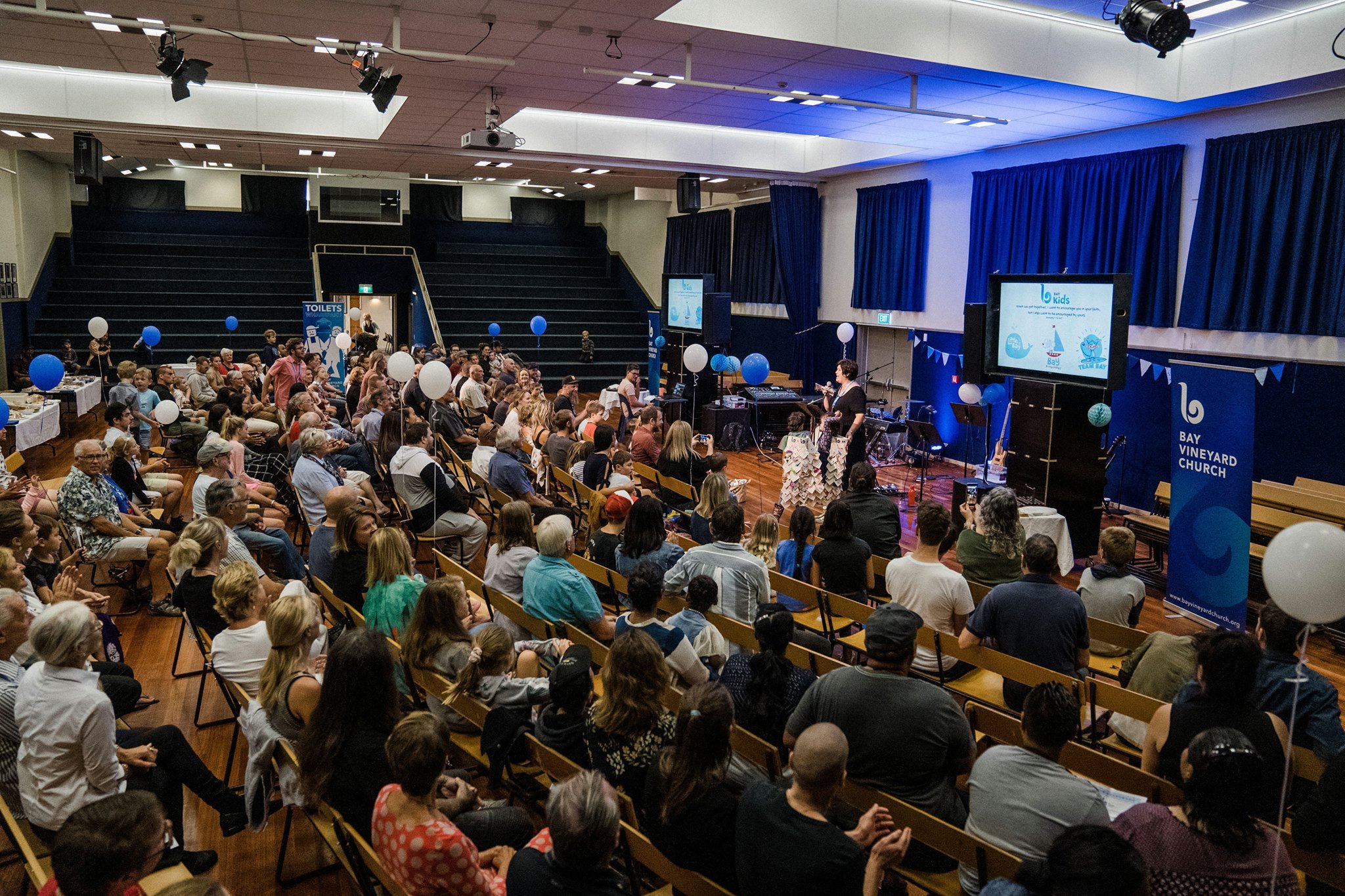Sam Harvey | Practising the Way + a new wave of contemplative pastors.
An SGM Interview with Sam Harvey
A new wave of contemplative pastors
Sam Harvey is the lead pastor at Bay Vineyard Church in Napier. In this blogpost, David Crawley has a conversation with Sam about his passion for spiritual formation being at the centre of church life, attending the Practising the Way conference in Portland and his message of encouragement and challenge to Spiritual Growth Ministries.
This article first appeared in the July issue of Refresh - A Way Through The Valley: Contemplative gifts for the future of the church.
Hi Sam. I know you planted the church where you are now in Napier, about five years ago. How long have you been in pastoral ministry?
My dad’s an Anglican vicar, so I spent 41 long years swimming in the church world, 20 of those in paid full-time vocational ministry in various churches around the country.
That’s half your life! Tell us a little bit about the church you’re currently pastoring.
We moved here six years ago and didn’t know anyone. We started gathering friends and a couple of families helped us plant the church. Celebrated our fifth birthday last Saturday. So, we’re established now, which is really cool. Even though COVID and everything made life tricky, we’ve still got a church!
You have a strong conviction that spiritual formation should be not a fringe thing, but at the centre of church life. How did that come about?
I’ve discovered that ‘spiritual formation’ can mean a lot of things for different people. It incorporates spiritual practices – silence and solitude, devotional practices, retreats, fasting, sabbath – but for me, it’s synonymous with discipleship. It’s orientated around following the way of Jesus. That conviction started when I was studying at the Bible College of New Zealand (now Laidlaw).
To be honest, I thought that the spiritual formation track looked like the easiest option! But it exposed me to a whole world that’s informed my own personal journey as a follower of Jesus and a pastor. When you’re finding life in Jesus through spiritual practices, and you’ve tapped into authors and movements in that space, you can’t help but share that with the community that you lead.
So how have you managed to bring that focus on discipleship, following the Jesus way, to your community?
Dallas Willard’s been one of the catalytic voices in the last 30 or 40 years. He argues every pastor needs to be asking the question, ‘how are we making disciples?’ And then the second question, ‘is it working?’ Next was Bridgetown Church, in Portland, Oregon. They define discipleship or formation as growing in three areas: learning to be with Jesus, to become like Jesus, and do what Jesus did. That’s the best summary I’ve ever heard of what it means to be a disciple.
There are all sorts of things you can do to help you become like Jesus. But the problem’s been we often put mission at the centre of what the church is all about. When discipleship is at the centre, mission will overflow, with far deeper roots, and far more authenticity.
Some people have felt uncomfortable with our focus as a church because, hey, isn’t mission meant to be at the centre? Well, no, I think that’s actually putting the cart before the horse.
So how do we do that? The first thing I observed is, as a rule, our under-45’s have no interior life of Jesus on the average day. That’s because they’ve grown up in a world of incredible distraction, with mobile phones and so on. They’ve grown up in a distraction economy with a lack of discipleship culture to teach people how to pray or to be with Jesus. But that has to be the anchor discipline in the Christian life.
We did some stuff on Sundays that taught people how to pray, using classic spiritual practices, set prayers, silence and solitude, and so on. We told them about apps for guided reflection.
We weren’t prescriptive because that can slide into legalism super quick. What we did say is, ‘What’s the next click for you and your inner life with Jesus?’ And because there’s so much trying to form you to live a life just on your phone, or whatever, let’s be accountable to one another, because we’re at that level of crisis when it comes to people’s interior life with Jesus.
We also oriented all our small group resources around practising the way of Jesus. We had modules on sabbath rest, deepening your devotional life, 24/7 prayer resources, and then things like Emotionally Healthy Spirituality that can help around the becoming like Jesus.
Then we began to lean into doing what Jesus did: missional life, justice, caring for the poor. In an embodied way, we’re trying to step into being good news by slowing down. That was what we started with. Let’s just teach our people to pray and foster a culture that celebrates that space, and then go from there in terms of building other spiritual disciplines.
We’ve just introduced the concept of a Rule of Life, where our schedule aligns with our values more and more.
You made a striking statement about the under 45s not having an interior life with Jesus. What’s the response been like from that demographic?
Unreal. Initially, there was a bit of scepticism: ‘I want this, but can I do it?’ Because everyone feels like their life’s fully busy, to the absolute limit. In the first couple of sessions, one of the guys said, ‘I’m going to pull over on the way home from work.’ He’s a busy guy with a young family, a deputy principal with a lot on his plate. ‘I’m going to pull over on the way home for five minutes and just do some sort of passive devotional thing, if I can.’
Formation doesn’t happen quickly, but fast forward and now that same person is getting up to spend an hour with Jesus early in the morning. In his words, it’s the most life-giving part of his day. It’s still a battle because there’s a billion-dollar industry trying to distract them. But that doesn’t bring life. It brings anxiety, depression, disappointment and disengagement.
All of this is in the context of community, which is very rich in itself. And it’s spilt over missionally – coming out of an interior life with Jesus, not a moment of inspiration out of a conference or a sermon.
I understand last year you and a number of other Kiwi pastors went across to Portland, to the Practicing the Way conference. Tell us a bit about that.
Yeah. Practicing the Way is a parachurch organisation that’s emerged out of a church called Bridgetown in Portland, a highly secular city, led by a guy called John Mark Comer. Fifteen years ago, he was wrestling with ecclesiology because he was so dissatisfied with what he’d been engaged with. He comes across all the Dallas Willard stuff, and Richard Foster, and thinks, ‘How can we get this happening in our churches? What if we tried to put formation at the centre?’
A lot of the spiritual director types said, ‘It’s never been done. Don’t try. This is just going to have to be a niche thing on the fringe.’ But Bridgetown went about putting spiritual formation/discipleship at the centre of their church and learning spiritual practices in the way of Jesus. I stumbled across them about six years ago, which really helped shape what we’re doing at Bay Vineyard. There’s an enormous hunger for this, among pastors like me, dissatisfied with what our church focus has been.
Cycling back to that Dallas Willard question. Are we making disciples? I think the answer is, unequivocally, not well. Studies in the US show only 8% of millennials come out of church – Christian kids – with some sort of basic faith. For all the money and energy getting spent, we can hardly say we’re forming resilient disciples of Jesus in our secular culture. John Mark has now set up a not-for-profit organisation with the goal of helping churches put this back at the centre: resources, pastors’ training, all sorts of stuff. It’s one of many things that are happening.
It’s early days, but I think it’s a genuine move of God, where discipleship/spiritual formation are being restored to the centre of the church.
You know a little bit about Spiritual Growth Ministries. What do you think we can do, if anything, to help support that desire?
First, I think Spiritual Growth Ministries (SGM) should be celebrating that this is happening! This is an answer to prayer for why SGM exists. So, celebrate it and engage with it. I’d be saying to anyone involved with SGM, point your pastor or vicar to all this stuff, saying, ‘Hey, isn’t this exciting?’ Because there’s now resources for small groups, through Practicing the Way and other places, that have never been there before – around spiritual disciplines and all sorts of stuff. I had to film all my own stuff before all this came out. I had to build everything because there was very little out there.
The need is going to grow exponentially, I think, for spiritual directors. Fast forwarding 10 years, I see there’s going to be a higher demand for spiritual directors.
Throughout church history, God brought waves of renewal to the church. I think this is another wave of renewal. Here’s a challenge! How can SGM ride the wave? What does that look like in terms of training, in different centres, or retreats that people are desperate for? We can get comfortable on the fringe with a niche thing. But this requires a different organisational vision if it’s starting to move formation/discipleship to the centre.
Next year there’s going to be a big conference for pastors, talking about spiritual formation in the church. If I was an SGM person, I’d be crying tears of joy that this is happening and working out how I can bless it!
That’s a good challenge, Sam, because some of us – not all – who are involved in SGM might be in a different place, theologically, or churchwise, to the Practicing the Way folks. But rather than saying, ‘Oh, I can’t relate to that language,’ or ‘I can’t relate to that theology,’ or whatever, we can look past all of that and ask, ‘What is God doing here, and how can we support it?’
Fully. I think with any organisation that wants to have a national voice in this space, there has to be a high amount of grace. Today, with the force of secularism, the strength of formation through culture can’t be overstated. So, it doesn’t matter what your theology is on some of the secondary stuff, the basics of being with Jesus, becoming like Jesus and doing what Jesus did are all things we can agree are central.
Indeed! Thank you for your time, Sam, we’ll continue to watch this space.
This article first appeared in the July issue of Refresh - A Way Through The Valley: Contemplative gifts for the future of the church.
Refresh is SGM’s journal of contemplative spirituality in Aotearoa, New Zealand. You can view the current issue of Refresh or browse the archives in the Refresh section of this website.









